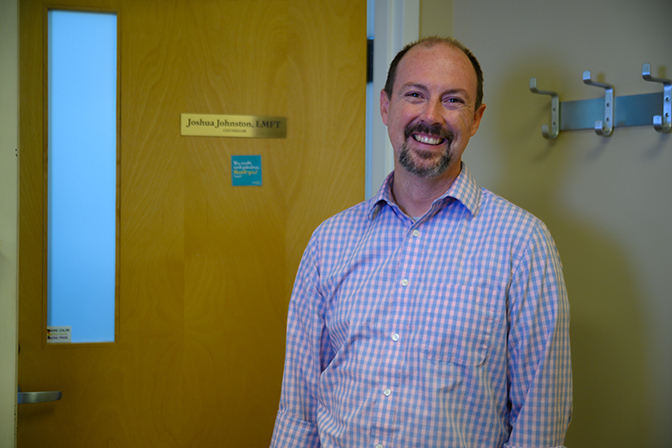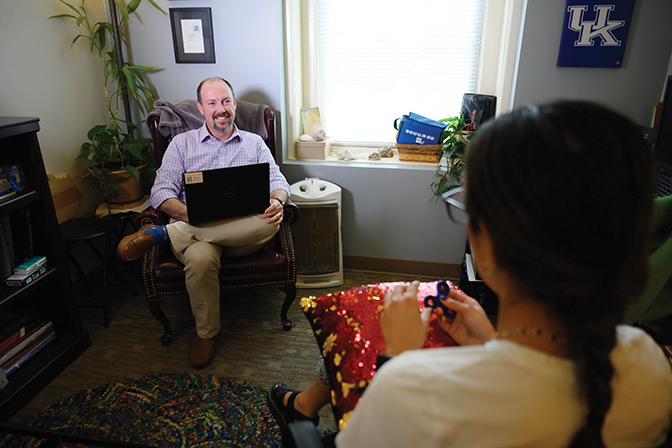Socioeconomic status can be an important factor in a college student’s ability to succeed. Though social pressures, financial struggles and emotional traumas are not limited to individuals from specific groups, they are more prevalent among the low-income and the marginalized. For this reason, Berea College ensures incoming students, including students participating in the summer Bridge program between high school and college, have access to high-quality mental-health services.
Many Berea College students are the first in their families to attend college, meaning they are pioneers into a world unknown to their parents. All of them are low-income—Berea College covers tuition and gives them a job to help with expenses as they gain professional experience. Many of them feel in some way marginalized, whether because they are of a racial, gender or economic minority, or simply because of the region they call home. At Berea, they find a place they can belong, where all other students share those economic aspects of their background.
According to research, students from these backgrounds have higher instances of adverse childhood experiences (ACEs). Simply put, they are more likely to have experienced hardship or trauma as kids: divorce, drug use, crime, death, economic or environmental devastation, housing instability, food insecurity, social stigmas, discrimination, abuse and more. Academic success and qualifying for admission to Berea College despite all that is quite the testament to a student’s resilience and resolve. Still, the college transition can be difficult and can intensify a student’s struggles.
“College is around the time people experience the onset of most mental-health conditions,” said Josh Johnston, mental health therapist for Berea College Counseling Services. “Counseling Services was invited to come and speak to all the participants in the Bridge program. Before students even enter their first full semester, they are being introduced to mental-health resources on campus.”

Johnston and others at Counseling Services help incoming students learn about the sources of support available to them through outreach, programming and partnerships with professors and labor supervisors. They come into the classroom to detail common mental-health problems and symptoms and encourage students to seek assistance if they start having issues.
“With the transition to college,” Johnston said, “this may be the first time a student is out of the house, experiencing life on their own and exploring what their unique value sets are. So, it’s really important when a person is going through that journey that they have access to those types of services.”
In addition to socioeconomic factors and ACEs, there may be cultural issues that prevent a student from seeking mental-health services and options. At home or in their broader home culture, therapy may be looked down upon or stigmatized. College may be the first time a student has had access to or awareness of any kind of mental-health services. There may not be mental-health providers available where they come from, the resources needed to access them or the cultural support to seek assistance.
This may be a student’s first opportunity to receive services where they’re able to talk to somebody in a confidential setting to explore what their value sets may be or explore their own mental-health symptoms.
Josh Johnston
“This may be a student’s first opportunity to receive services where they’re able to talk to somebody in a confidential setting to explore what their value sets may be or explore their own mental-health symptoms,” Johnston explained. “It’s often not the fault of their families. It may be just a dynamic that they haven’t had access to. Those three things—cultural values, prevalence rates and opportunity—are incredibly important as we look at our cohort of students.”
There is much Johnston cannot talk about because of issues of confidentiality and because of assumptions of what might be “typical.” He cannot talk about specific cases nor paint a picture of what is usual or unusual. Trauma comes in many forms for many reasons with many different effects. He shared a hypothetical situation as illustration.
A student, for example, may be known as an important caregiver in his family. The student takes care of siblings, prepares them meals, drives them to school, and so on. He is also trying to succeed academically in his own right. So, family responsibility and studies become his identity and what drives him toward success.
“And now they come to college,” Johnston said. “This was their out. This was their chance. Now you don’t have necessarily the same pressures. You’ve got food, shelter. You’ve got your basic needs met, and it becomes this identity experience and the pressure that’s placed on the self.
“So, they’re coming from a family of origin, and there is pressure to succeed, and at that first sign of stress, they may feel they are not able to do this,” he continued. “The real tension comes into play in battling the onset of some of these symptoms, whether it be anxiety or depression, which are the two most common nationwide. But our students can experience that in a really heavy way here.”
For students in the Bridge program, they are facing a transition. “Any type of transition that people go through is often met with a charged emotional experience. There’s the fear of the unknown, what’s going to happen next. There’s the difficulty of leaving what you’ve always known to create something new. It’s a particularly acute experience.”
That points to the resilience of our students, that I have heard so many shocking stories of what they’ve had to experience and what they’ve had to
Josh Johnston
endure. Yet, they’ve managed to push through.
From a wider perspective, the work being done with Berea College students is work that the institution as a whole hopes extends to the community outside and the places students come from. A student with a difficult past or dealing with a difficult present can become a successful scholar or employee and an impactful community and family member. Mental health in college for an individual can create better mental health among those connected to them. Very often, this cohort of students is stronger and more powerful than they realize.
“Prior to this,” Johnston concluded, “I worked in community mental health. I’ve heard more traumatic experiences here than I ever did there. That points to the resilience of our students, that I have heard so many shocking stories of what they’ve had to experience and what they’ve had to endure. Yet, they’ve managed to push through.”


